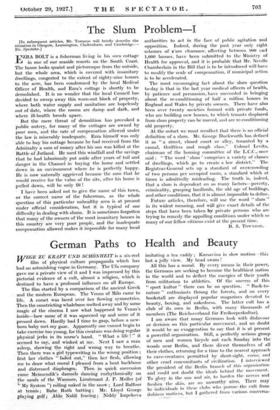The Slum Problem I
[In subsequent articles, Mr. Townroe will briefly describe the i
situation in Glasgow, Leamington, Cheltenham, and Cambridge.— En. Spectator.] EZRA BOLT is a fisherman living in his own cottage in one of our seaside resorts on the South Coast. The house looks quaint and picturesque from the outside, but the whole area, which is covered with insanitary dwellings, congested to the extent of eighty-nine houses to the acre, has been condemned by the local Medical Officer of Health, and Ezra's cottage is shortly to, be demolished. It is no wonder that the local Council has decided to sweep away this worn-out block of property, where both water supply and sanitation' are hopelessly out of date, where the rooms are damp and dark, and where ill-health breeds apace.
• But the mere threat of demolition has provoked a public outcry, for many of the cottages are owned by poor men, and the rate .of compensation allowed under the law is miserably inadequate. Ezra himself was only able to buy his cottage because he had received from the AdMiralty a sum of money after his son was killed at the Battle of Jutland. He used this windfall and the savings that' he had laboriously put aside after years of toil and danger in the. Channel in buying the home and settled down in an environment where he is perfectly happy. He is now naturally aggrieved because the sum that he would receive for the value of the site, after his home is pulled down, will be only £6 !
I have been asked not to give the name of this town, or the correct name of the fisherman, as the whole question of this particular unhealthy area is at present tinder official consideration, but it is typical of one difficulty in dealing with slums.' It is sometimes forgotten that many of the owners of the most insanitary houses in this country- are very poor people, and the inadequate compensation allowed makes it impossible for many local authorities to act in the face of public agitation and opposition. Indeed, during the past year only eight schemes of s'um clearance, affecting between .900 and 1,000 houses, have been submitted to the Ministry of- Health for approval, and it is probable that Mr. Neville Chamberlain in the Bill that is to be introduced will have to modify the scale of compensation, if municipal action is to be accelerated.
The most encouraging fact about the slum question to-day is that in the last year medical officers of health, by patience and persuasion, have succeeded in bringing about the re-conditioning of half a million houses in. England and Wales by private owners. There have also been over twenty societies formed with private funds, who are building new houses, to which tenants displaced from slum property can be moved, and are re-conditioning old property.
At the outset we must recollect that there is no official definition of a slum. Mr. George Duckworth has defined it as " a street, closed court or alley, tenanted by a casual, thriftless and rough class." Colonel Levita, chairman of the housing committee of the L.C.C., once said : " The word ' slum ' comprises a variety of classes of dwellings, which go to create a low district." The Registrar-General sets up a standard of overcrowding of two persons per occupied room, a standard which at times is admittedly misleading. The truth is, indeed, that a slum is dependent on so many factors—poverty, criminality, grasping landlords, the old age of buildings, and other conditions, that it is almost impossible to define.
Future articles, therefore, will use the word " slum " in its widest meaning, and will give exact details of the steps that have been taken by private persons who are trying to remedy the appalling conditions under which so many of our fellow citizens exist at the present time.
B. S. TOWNROE.


























































 Previous page
Previous page